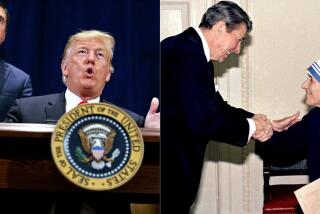Stealing George II’s Message
WASHINGTON — Something happened on the way to the coronation of King George II: A serious challenger appeared. But how could that be? King George II had all the money, virtually all the elected Republican governors, most congressional Republicans and a 40-50 point lead on the GOP presidential field. For months, these regal assets protected the young prince. In fact, he had enough weapons and momentum to cover up a critical flaw: He had no message or, to borrow a centuries-old passage, “The king has no clothes.”
Since George II needs to have things explained to him in simple terms, it’s like that old Texas saying: “You’re all hat and no cattle!”
Arizona Sen. John McCain, the emerging GOP contender, once again proved a fundamental maxim in presidential politics: A powerful message will trump big-time endorsements and money, void of a message, every time.
Believe me, I’ve been there. In 1984, Walter F. Mondale was as strong a front-runner going into the primaries as Bush was this year. His message: “I am ready to be president. I will have the delegates.” Gary Hart’s message: “Washington is overrun by special interests and needs to be fixed with a new attitude and new ideas.” Hart stomped Mondale in New Hampshire in 1984.
Fast-forward to primary night New Hampshire 2000. McCain pulverized Bush. And what was King George II’s message after defeat? “I will go to all 50 states and compete for all delegates, and I intend it to end at 1600 Pennsylvania Avenue.” McCain’s message: “We have sent a powerful message to Washington that change is coming.” George II was all process; McCain was all message.
Last year, McCain’s message was ridiculed by the political community, particularly for using campaign-finance reform as the centerpiece of his “change is coming” message. “No one cares about campaign-finance reform,” asserted the political intelligentsia. “It barely shows up in the polls.”
What these folks missed was that McCain was using campaign-finance reform to symbolize all those things people dislike about Washington: President Bill Clinton’s (and other elected servants’) infidelities, immorality, pork-barrel spending, special interests (read: big corporations and unions) buying their way into the process, etc.
To be sure, campaign-finance reform, as an issue, ranks low in the polls. Why? Because, to most Americans, special-interest money is deeply entrenched in politics. From their perspective, politics have long been controlled by the big boys, and the public believes there is little that the average American can do about it. But when you look at all the other issues that McCain has skillfully linked to his position on campaign money, from morality to the special-interest stronghold on Washington, you have powerful symbols that resonate with lots of voters. You’re talking big-time message.
As for George II, after spending an unprecedented $50 million before New Hampshire, after all the endorsements and after the huge advantage of being the son of a former president, all the voters can tell you about him is that he is the governor of some state, has a famous father, tons of money and a bunch of pols supporting him.
What has this cost George II? The most powerful message that was available to him at the start of his campaign: He’s not your typical Washington politician, but a bona fide outsider. Yet, through a series of remarkably inept moves, he handed that message to McCain, a Washington insider. Voters must be thinking that if all these Washington insiders support George II, he must be one, too. That’s not exactly a message that resonates with voters. Add to this a growing suspicion that George II can’t handle the job (I’ll leave it at that), and you’ve got a candidacy in trouble.
Historically, front-runners who lose to an underdog turn to negative campaigning. The problem with this switch is that when a front-runner, especially one whose strategy is to remain about the fray, turns to negative campaigning, it gives the media and the political community the impression that the campaign is in panic mode.
In the end, big money and control of the process may well get George II the nomination in 2000, as it did for Mondale in ’84. But in 1984, a relatively unknown Hart became the issue. He couldn’t stand the scrutiny and lost. The Bush folks are trying to do the same thing to McCain now. What did they open with? George II is better qualified than McCain to be the commander-in-chief. A former reserve officer who has never seen combat and flew a plane a few times is more qualified than a highly decorated war hero? Now that’s dumb. Oops, I said it!
More to Read
Sign up for Essential California
The most important California stories and recommendations in your inbox every morning.
You may occasionally receive promotional content from the Los Angeles Times.










